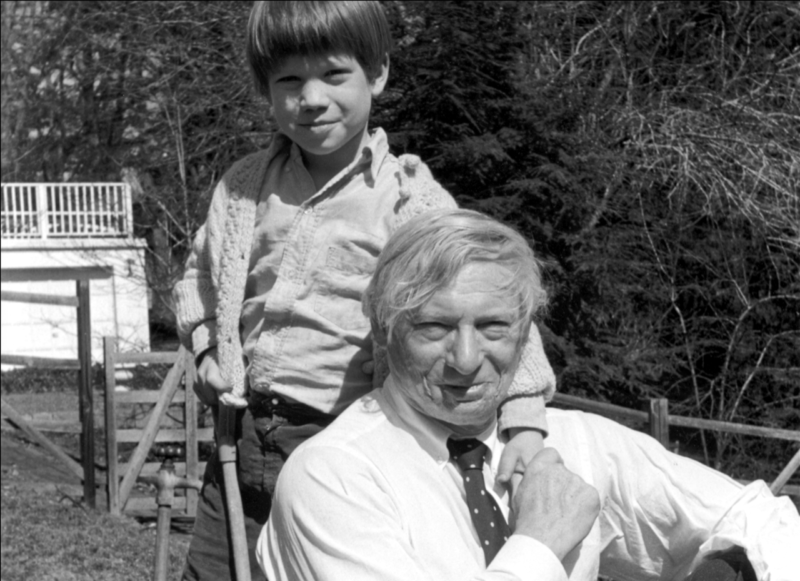Documentaries In Upcoming Film Series Share Common Theme of “Critical Biography”
FATHER FIGURE: The relationship of Nathaniel Kahn, left, with his father, famed architect Louis Kahn, is the focus of his documentary “My Architect,” one of three in a series screening at the Institute for Advanced Study.
By Anne Levin
A new film series debuting Friday afternoon at the Institute for Advanced Study (IAS) originated in a chance encounter that took place in the hills of Tuscany. It was there that filmmaker Nathaniel Kahn was an artist in residence at Villa I Tatti, Harvard University’s Center for Italian Renaissance Studies, working on a screenplay.
Kahn met a member of the IAS faculty, and the two got to talking about film. Fast forward a year, and Kahn is a visitor at the IAS School of Historical Studies. He and Historical Studies Professor Maria Loh have created the S.T. Lee film series, which begins with a screening of Kahn’s 2003 film My Architect, followed by a panel discussion. Admission to the event in Wolfensohn Hall is free and open to the public (reservations are necessary). Next in the series are a.k.a. Mr. Chow on November 1, and The Hunt for Planet B on November 15.
Princeton is familiar to the 61-year-old Kahn, who worked at McCarter Theatre and Thomas Sweet after graduating from college. He lived on Chestnut Street. During Kahn’s first visit to the IAS last year, Loh did a pop-up screening of one of his films. He loved the atmosphere.
“It was so wonderful to have the experience of this tremendously engaged community watching a film,” he said. “It creates a kind of sacred space. After the film, you can talk about things much more quickly. It opens questions. We had a great discussion after that screening.”
Once Kahn joined the IAS, he and Loh decided to create a film series, with much support from IAS Director David Nirenberg.
“These films are just the beginning,” Kahn said. “We want to do more in the spring. We want to bring films not just to the Institute community, but to the entire community. The screenings create these environments where we can talk about things afterward. As important as the screening is, the conversation is even more so. It’s a common experience, a collective experience, which we need more of today. It allows us to share something in common and then talk about it.”
Loh agreed. “When the lights go out, there is a sense of community that rises beyond individual desires and needs,” she said. “For those two hours, you are a community watching a film. It’s a sacred experience, something that lifts you out of yourself. That creates a sense of public that private, individual, isolated viewing does not allow for.”
This year marks two milestones related to My Architect — the 20th anniversary of the film, and the 50th anniversary of the death of Kahn’s father, famed architect Louis Kahn. Nathaniel Kahn was only 11 when his father, whom he barely knew, died suddenly of a heart attack in the men’s room of New York’s Penn Station.
The film, which was nominated for an Oscar, was Kahn’s exploration of his father’s groundbreaking projects across the globe. It also delves into his father’s mysterious personal life, which included a wife and daughter and two other secret families, unknown to each other. The film is at times heartbreaking, other times humorous, as the son attempts to reconnect with his deceased father.
“We all have personal histories,” Kahn said. “The idea that history is only written by the winners, is just not the case. A film like My Architect is about the idea that history is not what they tell you in the history books. It’s what is lived. Discovering my father’s history as an immigrant from Estonia, with all of the terror they escaped, and then coming to America and suffering here, is the story. We have to be a people that finds commonality in our stories, and we have to have the ability to listen to each other’s stories.”
“The film doesn’t really read as a documentary,” Loh said. “What is really moving about it is that it is a biography of Louis Kahn, but also kind of an autobiography of the director. We feel like we’re discovering the architect. By the end of the film, he becomes the viewer’s architect as well.”
Kahn directed another film in the series, The Hunt for Planet B. The film follows a group of scientists, many of whom are women, behind the scenes with NASA’s Webb Space Telescope on their quest to find another Earth among the stars.
“Science sometimes has a hard time communicating its stories to the public,” Kahn said. “Art and science share so much in common. That’s what I discovered in making the film. Scientists and artists are completely passionate and willing to risk everything for what they’re after.”
Filmmakers Diane Moy Quon and Jean Tsien will be on hand for the screening of a.k.a. Mr. Chow, which they produced. The film tells the story of the famed New York restauranteur whose secret desire was to be a painter, and finally gets the inner strength to pursue his dream.
“The word ‘courage’ is the unifying thing in all the films we’re showing,” Kahn said. “They exhibit this unifying passion for what they’re doing. I loved making a film about scientists and presenting them as very compelling human beings. They reach out into the night, and they don’t know what’s there. They’re experimental, and I wanted to represent that. While the film is about the building of the Webb Telescope, it’s the human endeavor behind that that is interesting to me, in every film I make.”
The Friday, October 18 screening of My Architect begins at 4 p.m. a.k.a. Mr Chow is on November 1 at 5 p.m., while The Hunt for Planet B is November 15 at 5 p.m.
To sign up for the screenings, visit ias.edu.


